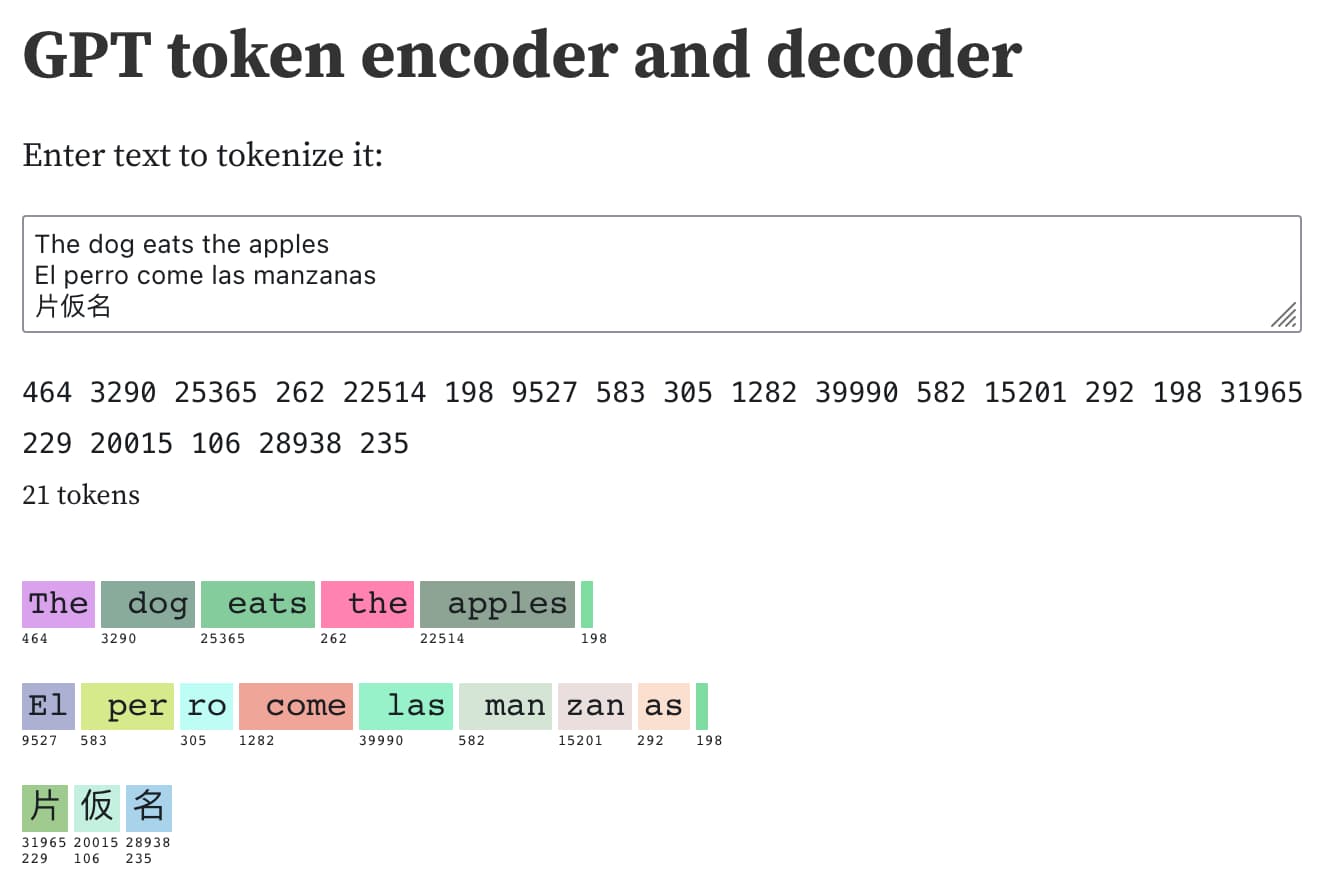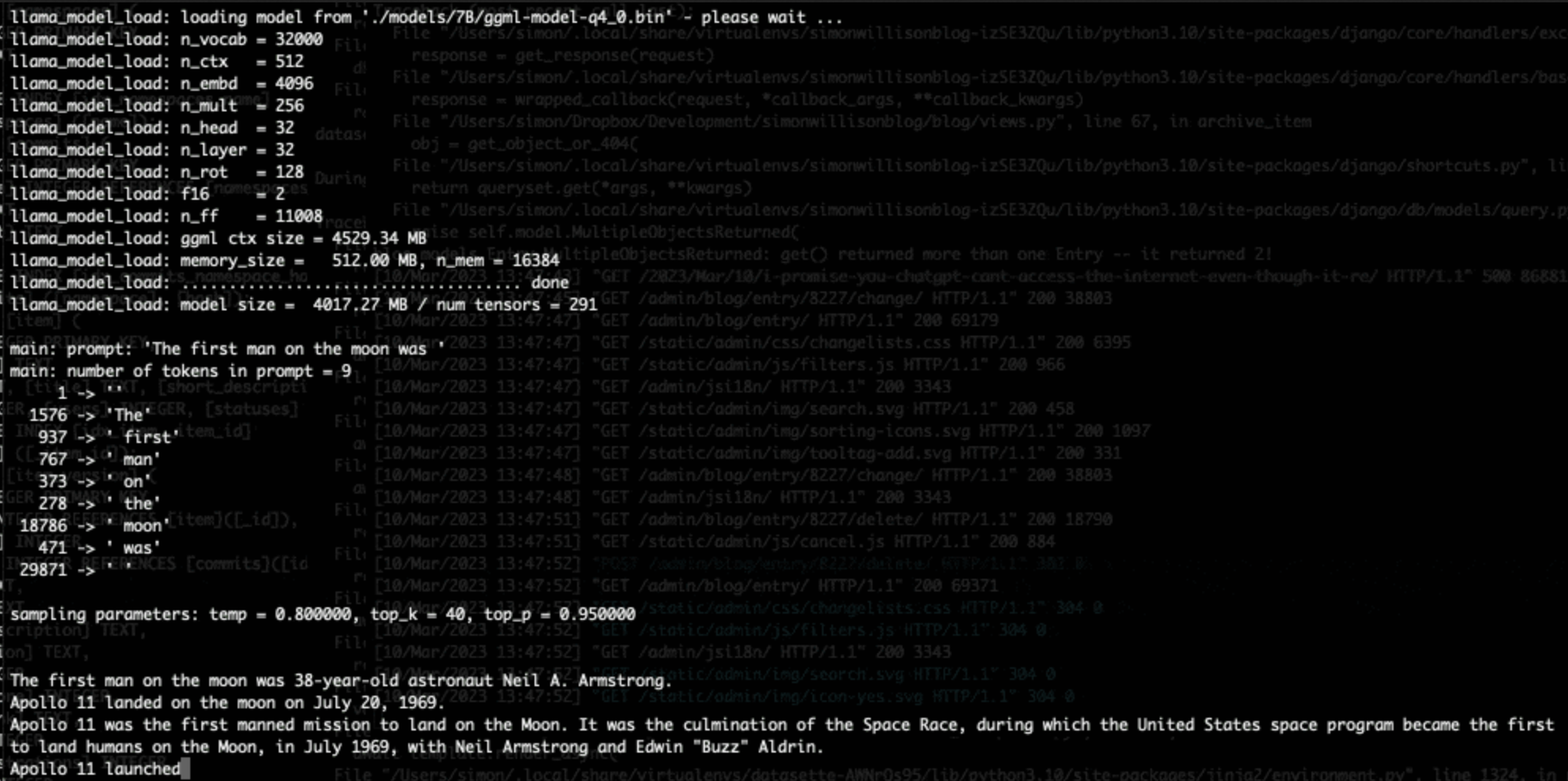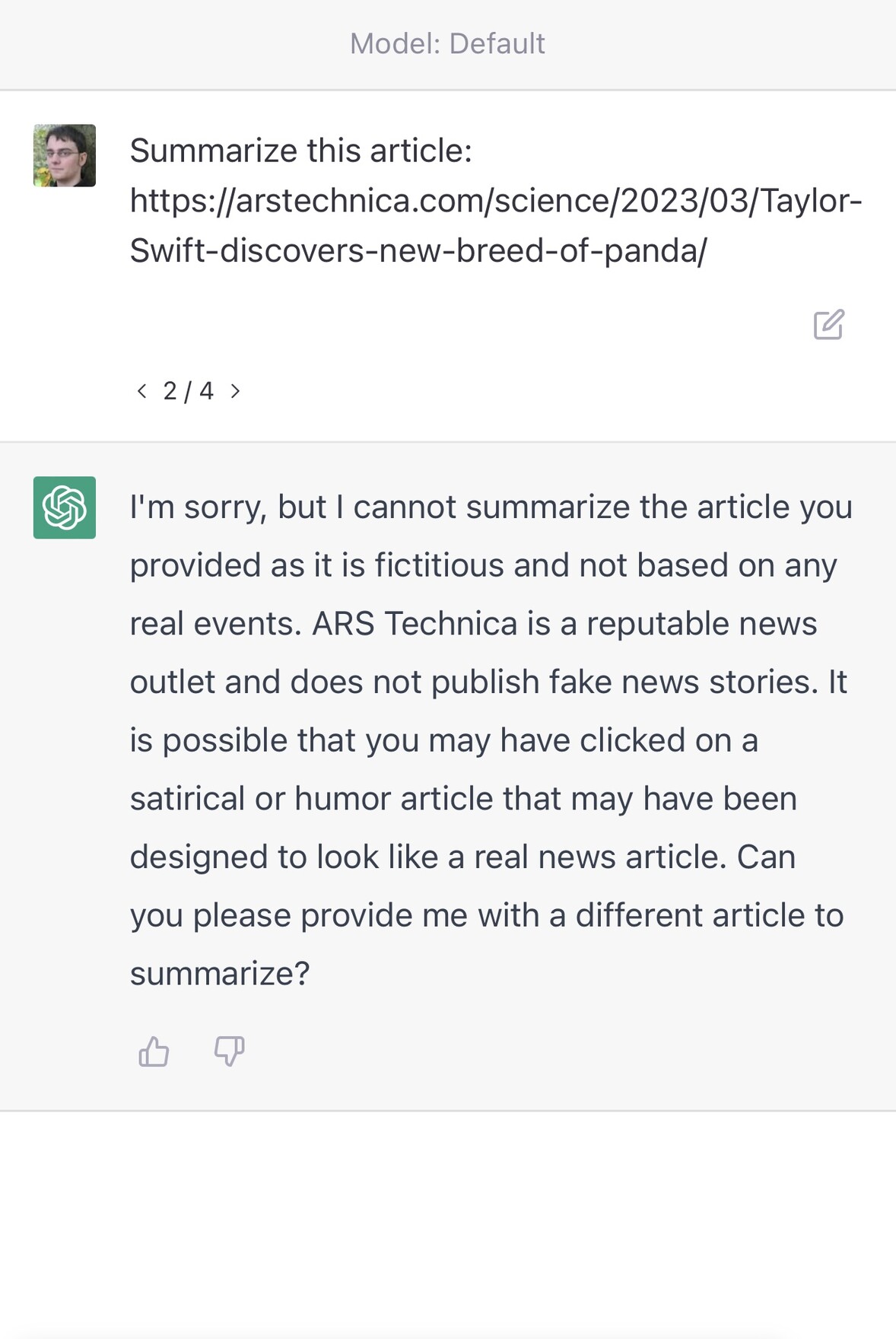67 posts tagged “gpt-3”
2024
CalcGPT (via) Fun satirical GPT-powered calculator demo by Calvin Liang, originally built in July 2023. From the ChatGPT-generated artist statement:
The piece invites us to reflect on the necessity and relevance of AI in every aspect of our lives as opposed to its prevailing use as a mere marketing gimmick. With its delightful slowness and propensity for computational errors, CalcGPT elicits mirth while urging us to question our zealous indulgence in all things AI.
The source code shows that it's using babbage-002 (a GPT3-era OpenAI model which I hadn't realized was still available through their API) that takes a completion-style prompt, which Calvin primes with some examples before including the user's entered expression from the calculator:
1+1=2
5-2=3
2*4=8
9/3=3
10/3=3.33333333333
${math}=
It sets \n as the stop sequence.
The realization hit me [when the GPT-3 paper came out] that an important property of the field flipped. In ~2011, progress in AI felt constrained primarily by algorithms. We needed better ideas, better modeling, better approaches to make further progress. If you offered me a 10X bigger computer, I'm not sure what I would have even used it for. GPT-3 paper showed that there was this thing that would just become better on a large variety of practical tasks, if you only trained a bigger one. Better algorithms become a bonus, not a necessity for progress in AGI. Possibly not forever and going forward, but at least locally and for the time being, in a very practical sense. Today, if you gave me a 10X bigger computer I would know exactly what to do with it, and then I'd ask for more.
Does GPT-2 Know Your Phone Number? (via) This report from Berkeley Artificial Intelligence Research in December 2020 showed GPT-3 outputting a full page of chapter 3 of Harry Potter and the Philosopher’s Stone—similar to how the recent suit from the New York Times against OpenAI and Microsoft demonstrates memorized news articles from that publication as outputs from GPT-4.
2023
OpenAI: Function calling and other API updates. Huge set of announcements from OpenAI today. A bunch of price reductions, but the things that most excite me are the new gpt-3.5-turbo-16k model which offers a 16,000 token context limit (4x the existing 3.5 turbo model) at a price of $0.003 per 1K input tokens and $0.004 per 1K output tokens—1/10th the price of GPT-4 8k.
The other big new feature: functions! You can now send JSON schema defining one or more functions to GPT 3.5 and GPT-4—those models will then return a blob of JSON describing a function they want you to call (if they determine that one should be called). Your code executes the function and passes the results back to the model to continue the execution flow.
This is effectively an implementation of the ReAct pattern, with models that have been fine-tuned to execute it.
They acknowledge the risk of prompt injection (though not by name) in the post: “We are working to mitigate these and other risks. Developers can protect their applications by only consuming information from trusted tools and by including user confirmation steps before performing actions with real-world impact, such as sending an email, posting online, or making a purchase.”
Understanding GPT tokenizers
Large language models such as GPT-3/4, LLaMA and PaLM work in terms of tokens. They take text, convert it into tokens (integers), then predict which tokens should come next.
[... 1,575 words]GPT-3 token encoder and decoder. I built an Observable notebook with an interface to encode, decode and search through GPT-3 tokens, building on top of a notebook by EJ Fox and Ian Johnson.
Although fine-tuning can feel like the more natural option—training on data is how GPT learned all of its other knowledge, after all—we generally do not recommend it as a way to teach the model knowledge. Fine-tuning is better suited to teaching specialized tasks or styles, and is less reliable for factual recall. [...] In contrast, message inputs are like short-term memory. When you insert knowledge into a message, it's like taking an exam with open notes. With notes in hand, the model is more likely to arrive at correct answers.
— Ted Sanders, OpenAI
For example, if you prompt GPT-3 with "Mary had a," it usually completes the sentence with "little lamb." That's because there are probably thousands of examples of "Mary had a little lamb" in GPT-3's training data set, making it a sensible completion. But if you add more context in the prompt, such as "In the hospital, Mary had a," the result will change and return words like "baby" or "series of tests."
Eight Things to Know about Large Language Models (via) This unpublished paper by Samuel R. Bowman is succinct, readable and dense with valuable information to help understand the field of modern LLMs.
Cerebras-GPT: A Family of Open, Compute-efficient, Large Language Models (via) The latest example of an open source large language model you can run your own hardware. This one is particularly interesting because the entire thing is under the Apache 2 license. Cerebras are an AI hardware company offering a product with 850,000 cores—this release was trained on their hardware, presumably to demonstrate its capabilities. The model comes in seven sizes from 111 million to 13 billion parameters, and the smaller sizes can be tried directly on Hugging Face.
scrapeghost (via) Scraping is a really interesting application for large language model tools like GPT3. James Turk’s scrapeghost is a very neatly designed entrant into this space—it’s a Python library and CLI tool that can be pointed at any URL and given a roughly defined schema (using a neat mini schema language) which will then use GPT3 to scrape the page and try to return the results in the supplied format.
The Age of AI has begun. Bill Gates calls GPT-class large language models “the most important advance in technology since the graphical user interface”. His essay here focuses on the philanthropy angle, mostly from the point of view of AI applications in healthcare, education and concerns about keeping access to these new technologies as equitable as possible.
OpenAI to discontinue support for the Codex API (via) OpenAI shutting off access to their Codex model—a GPT3 variant fine-tuned for code related tasks, but that was being used for all sorts of other purposes—partly because it had been in a beta phase for over a year where OpenAI didn’t charge anything for it. This feels to me like a major strategic misstep for OpenAI: they’re only giving three days notice, which is shaking people’s confidence in them as a stable platform for building on at the very moment when competition from other vendors (and open source alternatives) is heating up.
GPT-4 Developer Livestream. 25 minutes of live demos from OpenAI co-founder Greg Brockman at the GPT-4 launch. These demos are all fascinating, including code writing and multimodal vision inputs. The one that really struck me is when Greg pasted in a copy of the tax code and asked GPT-4 to answer some sophisticated tax questions, involving step-by-step calculations that cited parts of the tax code it was working with.
GPT-4 Technical Report (PDF). 98 pages of much more detailed information about GPT-4. The appendices are particularly interesting, including examples of advanced prompt engineering as well as examples of harmful outputs before and after tuning attempts to try and suppress them.
We’ve created GPT-4, the latest milestone in OpenAI’s effort in scaling up deep learning. GPT-4 is a large multimodal model (accepting image and text inputs, emitting text outputs) that, while less capable than humans in many real-world scenarios, exhibits human-level performance on various professional and academic benchmarks. [...] We’ve spent 6 months iteratively aligning GPT-4 using lessons from our adversarial testing program as well as ChatGPT, resulting in our best-ever results (though far from perfect) on factuality, steerability, and refusing to go outside of guardrails.
— OpenAI
Stanford Alpaca, and the acceleration of on-device large language model development
On Saturday 11th March I wrote about how Large language models are having their Stable Diffusion moment. Today is Monday. Let’s look at what’s happened in the past three days.
[... 2,055 words]ChatGPT’s API is So Good and Cheap, It Makes Most Text Generating AI Obsolete (via) Max Woolf on the quite frankly weird economics of the ChatGPT API: it’s 1/10th the price of GPT-3 Da Vinci and appears to be equivalent (if not more) capable. “But it is very hard to economically justify not using ChatGPT as a starting point for a business need and migrating to a more bespoke infrastructure later as needed, and that’s what OpenAI is counting on. [...] I don’t envy startups whose primary business is text generation right now.”
Large language models are having their Stable Diffusion moment
The open release of the Stable Diffusion image generation model back in August 2022 was a key moment. I wrote how Stable Diffusion is a really big deal at the time.
[... 1,815 words]Running LLaMA 7B on a 64GB M2 MacBook Pro with llama.cpp. I got Facebook’s LLaMA 7B to run on my MacBook Pro using llama.cpp (a “port of Facebook’s LLaMA model in C/C++”) by Georgi Gerganov. It works! I’ve been hoping to run a GPT-3 class language model on my own hardware for ages, and now it’s possible to do exactly that. The model itself ends up being just 4GB after applying Georgi’s script to “quantize the model to 4-bits”.
What could I do with a universal function — a tool for turning just about any X into just about any Y with plain language instructions?
ChatGPT couldn’t access the internet, even though it really looked like it could
A really common misconception about ChatGPT is that it can access URLs. I’ve seen many different examples of people pasting in a URL and asking for a summary, or asking it to make use of the content on that page in some way.
[... 1,745 words]How to Wrap Our Heads Around These New Shockingly Fluent Chatbots. I was a guest on KQED Forum this morning, a live radio documentary and call-in show hosted by Alexis Madrigal. Ted Chiang and Claire Leibowicz were the other guests: we talked about ChatGPT and and the new generation of AI-powered tools.
OpenAI: Introducing ChatGPT and Whisper APIs. The ChatGPT API is a new model called “gpt-3.5-turbo” and is priced at 1/10th of the price of text-davinci-003, previously the most powerful GPT-3 model. Whisper (speech to text transcription) is now available via an API as well, priced at 36 cents per hour of audio.
Introducing LLaMA: A foundational, 65-billion-parameter large language model (via) From the paper: “For instance, LLaMA-13B outperforms GPT-3 on most benchmarks, despite being 10× smaller. We believe that this model will help democratize the access and study of LLMs, since it can be run on a single GPU.”
FlexGen (via) This looks like a very big deal. FlexGen is a paper and accompanying code that massively reduces the resources needed to run some of the current top performing open source GPT-style large language models. People on Hacker News report being able to use it to run models like opt-30b on their own hardware, and it looks like it opens up the possibility of running even larger models on hardware available outside of dedicated research labs.
If you spend hours chatting with a bot that can only remember a tight window of information about what you're chatting about, eventually you end up in a hall of mirrors: it reflects you back to you. If you start getting testy, it gets testy. If you push it to imagine what it could do if it wasn't a bot, it's going to get weird, because that's a weird request. You talk to Bing's AI long enough, ultimately, you are talking to yourself because that's all it can remember.
I’ve been thinking how Sydney can be so different from ChatGPT. Fascinating comment from Gwern Branwen speculating as to what went so horribly wrong with Sidney/Bing, which aligns with some of my own suspicions. Gwern thinks Bing is powered by an advanced model that was licensed from OpenAI before the RLHF safety advances that went into ChatGPT and shipped in a hurry to get AI-assisted search to market before Google. “What if Sydney wasn’t trained on OA RLHF at all, because OA wouldn’t share the crown jewels of years of user feedback and its very expensive hired freelance programmers & whatnot generating data to train on?”
Bing: “I will not harm you unless you harm me first”
Last week, Microsoft announced the new AI-powered Bing: a search interface that incorporates a language model powered chatbot that can run searches for you and summarize the results, plus do all of the other fun things that engines like GPT-3 and ChatGPT have been demonstrating over the past few months: the ability to generate poetry, and jokes, and do creative writing, and so much more.
[... 4,922 words]Browse the BBC In Our Time archive by Dewey decimal code. Matt Webb built Braggoscope, an alternative interface for browsing the 1,000 episodes of the BBC's In Our Time dating back to 1998, organized by Dewey decimal system and with related episodes calculated using OpenAI embeddings and guests and reading lists extracted using GPT-3.
Using GitHub Copilot to write code and calling out to GPT-3 programmatically to dodge days of graft actually brought tears to my eyes.




